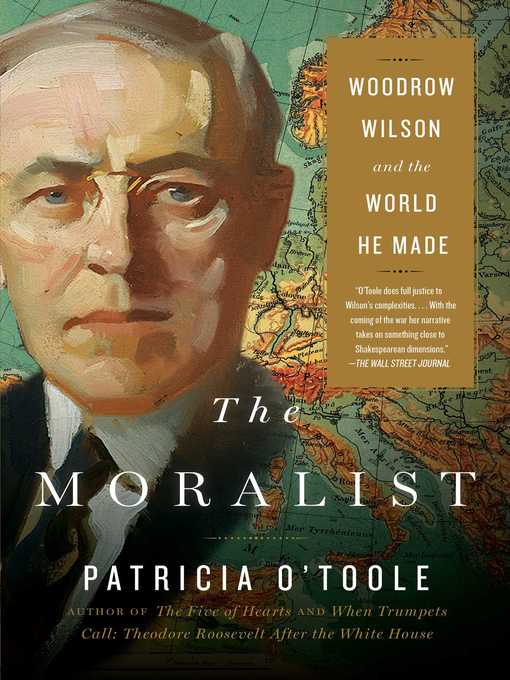
The Moralist
Woodrow Wilson and the World He Made
کتاب های مرتبط
- اطلاعات
- نقد و بررسی
- دیدگاه کاربران
نقد و بررسی

August 1, 2017
The author of The Five of Hearts, a finalist for Pulitzer, National Book Critics Circle, and Los Angeles Times Book Prize honors, O'Toole explores the controversies and consequences of Woodrow Wilson's presidency. In particular, she shows how Wilson repressed political dissent when finally leading the nation into World War I but emerged to advocate liberal internationalism, later adopted by President Franklin Roosevelt.
Copyright 2017 Library Journal, LLC Used with permission.

February 15, 2018
O'Toole (When Trumpets Call: Theodore Roosevelt After the White House, 2005, etc.) adds to a long list of Woodrow Wilson (1856-1924) biographies with a skillfully crafted account of the president's life and legacy.As suggested in the title, Wilson considered himself the moral conscience of the United States, and he acted accordingly. After earning a doctorate in political science from Johns Hopkins, he went on to serve as president of Princeton University, a position he approached with an inflexible certainty that he would carry into the White House, a stance that eventually led to impassioned opposition from many fellow Democrats and almost all Republicans. The author narrates the saga chronologically, and her use of anecdotes, foreshadowing, and foils to Wilson results in a lengthy book that is nonetheless a compelling page-turner; the author also has a pleasing prose style. As expected, the majority of the chapters focus on the debate over whether the U.S. should surrender its neutrality to enter World War I, the progress of the war from an American perspective, and the agonizing aftermath as Wilson failed to push through the League of Nations he conceived. Though not exactly groundbreaking news, many readers will still be shocked by the massive coverup of Wilson's declining health by his wife, Edith, and some of his advisers. O'Toole softens her subject's hard edges by showing his romantic side with his first wife, who died young, with Edith, and with his three daughters. In addition, the author pays adequate attention to Wilson's early domestic legislative achievements as well as his tendency toward racism and his overbearing public certainty, which he maintained despite frequent private doubts. Many of O'Toole's revelations break fresh ground, including the unreliability of Wilson adviser Edward M. House as a source. A bonus derives from the obvious relevance of the Wilson presidency to 21st-century politics. The ways in which Wilson expanded presidential powers bring to mind presidents George W. Bush, Barack Obama, and Donald Trump.A balanced, welcome new addition to the Wilson shelf.
COPYRIGHT(2018) Kirkus Reviews, ALL RIGHTS RESERVED.

March 5, 2018
O’Toole (The Five of Hearts: An Intimate Portrait of Henry Adams and His Friends, 1880–1918) offers a comprehensive biography of Woodrow Wilson and a fresh perspective on his moral vision and legacy. The book provides an intimate portrait of Wilson’s life and identifies his “deep sense of moral responsibility” as the guiding factor behind his actions and decision-making: his extensive domestic reforms to broaden economic security, his invasion of Mexico to stave off revolution and dictatorship there, his belief in U.S. neutrality after the outbreak of war in Europe, his eventual decision to send troops to make the world “safe for democracy,” and his fight for the League of Nations. O’Toole writes with compassion and impartiality, and does not fail to note Wilson’s self-righteousness, his political blunders, and the more sordid aspects of his administration—his “immoral bargain” of segregating the civil service in return for Southern Democratic votes, his “refusal to budge on women’s suffrage,” and his stifling of wartime dissent. Unfortunately, Wilson’s interventions in Central America and the Caribbean are only granted a couple of passing mentions; scholars and students of foreign policy will notice that glaring omission. Nevertheless, this gracefully written account will likely renew debates on Wilson’s role in a century of U.S. foreign policy and the role of the United States in international affairs.

























دیدگاه کاربران